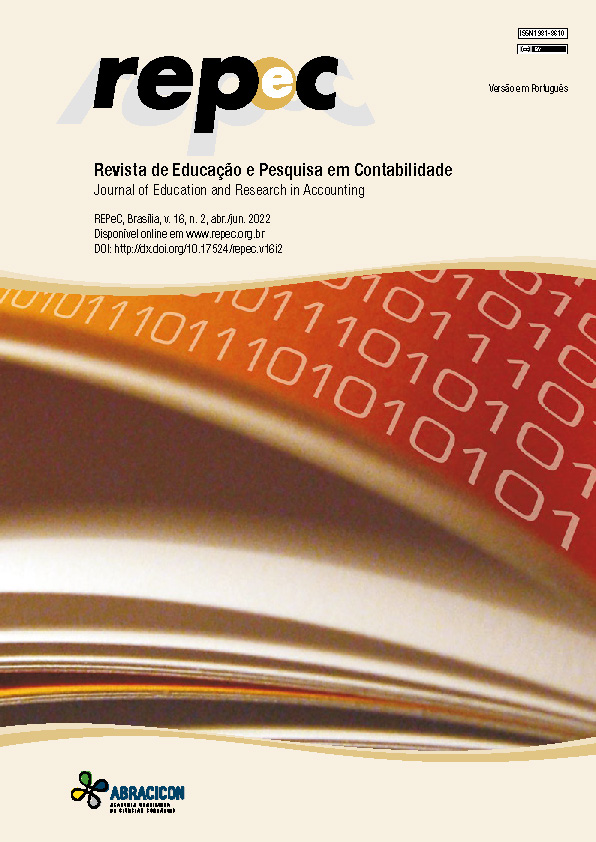Sustainability of public policy on tax relief in Brazil
Tax Waiver of Tax and Non-State Public Service
DOI:
https://doi.org/10.17524/repec.v16i2.2960Keywords:
Non-State Public Service, State Supplementary Action, Tax ExemptionAbstract
Objective: to introduce and test a theoretical, non-parametric model to assess a public policy of tax relief, combining the benefit of the tax waiver (RFT) with a non-state public service offer (SPnE), which identifies a Supplementary State Action (ASE) with metrics that signal that public policy is sustainable.
Method: non-parametric positivist, supported by an analytical model of equations that quantify each indicator of the model to identify and bring consistency to the metrics, as defined.
Results: obtained with academic configuration data, retrieved from the rendering of accounts of civil society organizations (CSO), treated by the Research and Extension Laboratory of the Third Sector (LPETS) of the University of Brasília (UnB), signal the robustness and consistency of the metrics of the model in assessing the sustainability of public policy on tax relief in Brazil.
Contributions: they are relevant for the literature, as well as for regulators, managers and researchers, because they signal the adequate specification of the model in signaling the sustainability of public policy. Application is encouraged with market data that can identify any restrictions and limitations of the model.
References
Brasil. Lei nº 13.019 de 2014. Disponível em: http://www.planalto.gov.br/CCIVIL_03/_Ato2011-2014/2014/Lei/L13019.htm.
Brasil. Constituição Federal de 1988. Disponível em <http://www.planalto.gov.br/ccivil_03/constituicao/constituição.htm>.
Barman, E. (2013). Classificatory Struggles in the Nonprofit Sector: The Formation of the Nacional Taxonomy of Exempt Entites, 1969 – 1987. Social Sciente History, v. 37 n. 1, pp. 103-141.
Botelho, L. H. F., Abrantes, L. A., & Fialho, N. S. (2019). Reflexões sobre as aplicações de políticas de desonerações tributárias no desenvolvimento regional brasileiro. Cadernos Gestão Pública e Cidadania, 24(79).
Cairns, B., Harris, M., HUTCHISON, R., & TRICKER, M. (2005), “Improving performance? The adoption and implementation of quality systems in U.K. nonprofits”, Nonprofit Management and Leadership”, V. 16, nr. 2, pp. 135-151.
CFC. Conselho Federal de Contabilidade. (2015). ITG 2002 (R1): Entidades sem Finalidade de Lucros. Disponível em: http://www2.cfc.org.br/sisweb/sre/detalhes_sre.aspx?Codigo=2015/ITG2002%28R1%29> Acesso em: 01 Agosto 2019.
Clotfelter, C. T.(1989). Tax-induced distortions in the voluntary sector. Cas. W. Res. L. Rev. V.39, nr. 3, pp. 663-694.
Cordery, C., & Sinclair, R. (2013). Measuring performance in the Third Sector. Qualitative Research in Accounting & Management. V. 10, n. 3/4, pp. 196-212. http://dx.doi.org/10.1108/QRAM-03-2013-0014.
Dubnick, M. J. (2003). Accountability and Ethics: Reconsidering the relationships. International Journal of Organization Theory and Behavior, v. 6, n.3, pp. 405-441.
Ebrahim, A., & Rangan, V. K. (2010), The Limits of Nonprofit Impact: A Contency Framework for Measuring Social Performance, Harvard Business School, USA, available at: https://www.hbs.edu/faculty/Publication%20Files/10-099_0b80d379-8e88-4992-9e8f-4b79596b1ff9.pdf (access 01 Agosto 2019).
Gjems-Onstad, O. (1993). Value added taxation on the third sector. Voluntas. V. 4, nr. 3, pp. 372-394.
Gomes, D. D. P. (2020). Os impactos das Propostas de Emenda Constitucional 45/2019, 110/2019 e 128/2019 sobre as organizações da sociedade civil. FGV Coordenadoria de Pesquisa Jurídica Aplicada.
Gruber, J. E. (1987). Controlling bureaucracies: Dilemmas in democratic governance. Berkeley, CA: University of California
Held, D. (2007). Models of democracy 3.ed. Polity Press. https://books.google.com.br/books?hl=pt-BR&lr=&id=QYVZ3TjL0-UC&oi=fnd&pg=PP14&dq=Held,+David.+Models+of+democracy&ots=rmmmEiVhCx&sig=wKPECW_TxxHjAWgT6CDnQwBirBY#v=onepage&q=Held%2C%20David.%20Models%20of%20democracy&f=false.
Martins, O. S. (2012). Terceiro Setor – aspectos tributários e incentivos fiscais. Revista Brasileira de Contabilidade. V.1, n. 160, p. 26-37. Disponível em: <http://rbc.cfc.org.br/index.php/rbc/article/view/685>. Acesso em: 01 Agosto 2019.
Oliveira, M. R. (2015). As imunidades tributárias das entidades de assistência social como instrumentos de concretização de direitos fundamentais e o caso das APAES. 2015. Dissertação (Programa Strictu Sensu em Direito) - Universidade Católica de Brasília, Brasília, 2015.
Paes, J. E. S. (2003). Fundações e Entidades de Interesse Social. 4.ed. Brasília. Brasília Jurídica.
Pitkin, H. F. (1967). The Concept of Representation. University of California Press. Berkeley
Romzek, B. S., & Ingraham, P. W. (2000). Cross Pessures of Accountability: Initiative, Command, and Failure in the Ron Brown Plane Crash. Public Administration Review, v. 60, n.3.
Rosen, B. (1989). Holding government bureaucracies accountable (2nd ed.). New York: Praeger Publishers https://books.google.com.br/books?hl=pt-BR&lr=&id=WiajjZwflO8C&oi=fnd&pg=PR9&dq=Rosen,+B.+(1989).+Holding+government+bureaucracies+accountable+(2nd+ed.).+New+York:+Praeger+Publishers&ots=0iA47q4fop&sig=byajfavPuhWmdKl9ags7ODN7hhg#v=onepage&q&f=false
Salamon, L. M., & ANHEIER, H. K. (1992). In Search of the Nonprofit Sector II: The Problem of Classification. Voluntas. V. 3, nr. 3, pp-267-309.
Schedler, A. (1999). Conceptualizing accountability The self-restraining state: Power and accountability in new democracies (pp. 13-28)..https://books.google.com.br/books?hl=pt-BR&lr=&id=MD8Vx1HLOZgC&oi=fnd&pg=PA13&dq=Schedler,+A.+(1999).+Conceptualizing+accountability&ots=-lS7tpyPN0&sig=s4i4FXb0w7K48SrPNtuyqEDkCTE#v=onepage&q=Schedler%2C%20A.%20(1999).%20Conceptualizing%20accountability&f=false.
Scott, M. B., & Lyman, S. M. (1968). Accounts. American Sociological Review, v. 33, n. 1, pp. 46-62.
Sean, J. G. (2016). Corporate Governance in an Era of Compliance. v 57, nr. 6. Wm. & Mary L. Rev.
Surrey, S. S. (1967). The US Income Tax System–the Need for a Full Accounting. Speech before the Money Marketers, November, 15(1967), 322-26.
Wagner, A. (2012). Third sector and/or ‘civil society’: a critical discourse about scholarship relating to intermediate organizations. Voluntary Sector Review, v. 3, n. 3, pp. 299-328. http://dx.doi.org/10.1332/204080512X658036.
Whitaker, G. P.; Altman-Sauer, L., & Henderson, M. (2004). Mutual accountability between governments and nonprofits: Moving beyond “Surveillance” to “Service”. The American Review Administration. V. 34, n. 2, pp. 115-133. Doi: 10.1177/0275074004264091.
Downloads
Published
How to Cite
Issue
Section
License
Copyright (c) 2022 Journal of Education and Research in Accounting (REPeC)

This work is licensed under a Creative Commons Attribution 4.0 International License.
Authors who publish with this journal agree to the following terms:
Authors retain copyright and grant the journal right of first publication with the work simultaneously licensed under Creative Commons Attribution 3.0 Unported License, which allows the sharing of the work and recognition of authorship and its initial publication in this journal. This license allows others to distribute, remix, adapt, or create derivative works, even for commercial purposes, provided credit is given for the original creation.
b)There is no financial compensation to the authors in any capacity, for articles published in RePEc.c) The articles published in RePEc are the sole responsibility of the authors.
